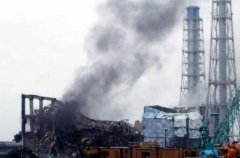Black smoke rises from reactor number three at the Fukushima nuclear power plant in March 21, 2011.
"The TEPCO Fukushima Nuclear Power Plant accident was the result of collusion between the government, the regulators and (plant operator) TEPCO, and the lack of governance by said parties," said the report by the Diet's Fukushima Nuclear Accident Independent Investigation Commission.
 AFPLast year's nuclear accident at Fukushima was a man-made catastrophe and not
only due to the tsunami that hit the plant, a Japanese parliamentary panel said
Thursday in its final report on the disaster."They effectively betrayed the nation's right to be
safe from nuclear accidents. Therefore, we conclude that the accident was
clearly 'man-made'.
AFPLast year's nuclear accident at Fukushima was a man-made catastrophe and not
only due to the tsunami that hit the plant, a Japanese parliamentary panel said
Thursday in its final report on the disaster."They effectively betrayed the nation's right to be
safe from nuclear accidents. Therefore, we conclude that the accident was
clearly 'man-made'.
"We believe that the root causes were the organisational and regulatory systems that supported faulty rationales for decisions and actions, rather than issues relating to the competency of any specific individual."
The probe is the third of its kind in Japan since the world's worst nuclear crisis in a generation.
An earlier report by plant operator Tokyo Electric Power (TEPCO) had all but cleared the huge utility, saying the size of the earthquake and tsunami was beyond all expectations and could not reasonably have been foreseen.
But an independent group of scholars and journalists, who reported their findings in February, said TEPCO could and should have done more.
It also said that had the company had its way, its staff would have been evacuated from the crippled plant and the catastrophe could have spiralled even further out of control.
The findings published on Thursday call for further investigation into the impact of the 9.0 magnitude earthquake -- as opposed to the towering tsunami -- on the reactors at Fukushima.
"As for direct cause of the accident, the commission reached the conclusion that we cannot definitely say any devices that were important for safety were not damaged by the earthquake," it said.
"We cannot rule out the possibility that a small-scale LOCA (loss-of-coolant accident) occurred at the reactor No. 1 in particular."
Although many scientists and activists have questioned the dominant narrative that cooling systems were knocked out by the rising waters, the government and TEPCO have been unwilling to say the reactors were damaged by the initial earthquake.
Tectonically-volatile Japan has a network of nuclear reactors that, until Fukushima, had supplied around a third of the nation's electricity.
The nuclear industry has long boasted of its many safeguards against earthquakes, but much recent public opposition to atomic power has focused on the vulnerability of plants, especially those that sit near seismic faults.
The report said "it is considered that TEPCO management knew about delays in anti-quake works and postponement of tsunami measures and were aware that the Fukushima Daiichi (number one plant) was vulnerable."
TEPCO also failed to act promptly in the early stages of the disaster, the panel concluded, but added: "This should not be attributed to individuals... at the plant but the structural problems of TEPCO."
The administration of then premier Naoto Kan hampered operations as the disaster unfolded, the report said, and did not use a logical chain of command.
"The prime minister's office was supposed to contact the plant operator through an on-the-spot taskforce. But... issued direct instructions to TEPCO head office and the accident site, confusing the command line."
Japan's nuclear watchdog was remiss because it did not force TEPCO to act, even when it knew things were going wrong, the report said.
"The Nuclear Industrial Safety Agency (NISA) knew TEPCO was postponing taking measures but did not give clear instructions," it said, adding NISA "was unprepared for a disaster whose scale exceeded past accidents."
(AFP)


























